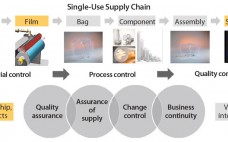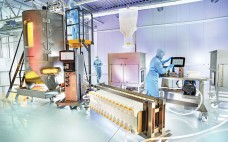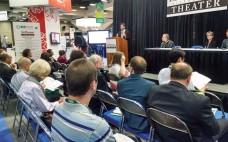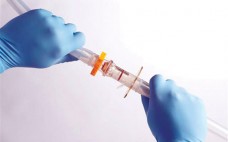Growing adoption of single-use bags in commercial production of biopharmaceutical drugs raises new challenges for bag suppliers and drives the need for consistent product quality, improved assurance of supply, robust change management, and business continuity planning. In close collaboration with resin and film suppliers, polymer scientists and biologists at Sartorius Stedim Biotech have followed a stringent material science and quality by design (QbD) program to develop a completely new polyethylene film and to achieve consistent performance of new Flexsafe bags…
Single Use
Total Solutions Support the Growth of a Dynamic Industry: A Conversation with Reinhard Vogt and Stefan Schlack
While attending a conference at Sartorius Stedim Biotech in Göttingen, Germany, BPI publisher Brian Caine and editor in chief Anne Montgomery spoke with Reinhard Vogt (executive vice president of marketing sales and services, and member of the administrative board) and Stefan Schlack (senior vice president, marketing and product management). They discussed Sartorius’s forward-thinking business strategies, its position as a total solution provider, and how the company’s strategic goals mesh with its assessment of current industry directions. Single-Use As an Enabling…
Disposables for Biomanufacturing: A User’s Perspective
The supply scenario for many biopharmaceutical drugs such as monoclonal antibodies (MAbs) is changing. With the implementation of personalized medicine resulting in drugs for specific, high-responder subsets of patients, market volume per drug will decrease. In addition, increasing fermentation titers of up to 10 g/L for MAbs are leading to smaller fermentation volumes necessary to accommodate individual biopharmaceutical market demands. That results in approaches such as flexible production in campaigns or decentralization of manufacturing using similar facilities with low risk…
BPI Theater at the 2014 BIO Convention
When we launched the BioProcess Theater series at the Biotechnology Industry Organization’s International Convention in 2007, we hoped that our special programming would fill a need within that event’s exhibit hall. We wanted to bring into the hall the type of technical presentations that are not generally part of the main event’s more executive-level, business-focused programming.It has therefore been especially gratifying to see our attendance growing every year — such that standing-room-only is becoming more the rule than the exception.…
Biopharma Unhappy with Suppliers’ Progress on Single-Use Hookups
Single-use equipment vendors are failing to meet their biomanufacturing customers’ expectations in several key areas, according to BioPlan Associates’ 11th Annual Report and Survey of Biopharmaceutical Manufacturing Capacity and Production (1). The study — based on a global survey of 238 global biomanufacturers and contract manufacturing organizations, as well as 158 vendors and suppliers in 30 countries — identifies significant gaps between the perceived importance of key vendor attributes and companies’ satisfaction with their vendors regarding those attributes. One area…
Industry Experts Convene in New York to Discuss Latest Innovations: A BPI Special Report
As the biopharmaceutical industry continues to mature and grow, so too does the need to educate a broader audience of biopharmaceutical professionals interested in hearing, understanding, and applying the latest science and technology trends that support and in many cases are transforming today’s bioprocesses. To reach this extended and engaged audience, BioProcess International created the BPI Theater Series: a live, interactive program that provides bioprocessing content to traditional, noncore biopharmaceutical conference programs. It provides attendees with the opportunity to interact…
Development of a Single-Use Filling Needle
Single-use components such as tubing, connectors, and filters have been widely used for many decades in bioprocess unit operations. Users have been able to identify and quantify the specific benefits of single-use over cleanable systems. In more recent years, many other process components have been designed for disposability such as bioreactors, mixers, and chromatography and ultrafiltration systems. Those and other advances have made it possible to incorporate multicomponent, presterilized manifolds into both existing and new processes, realizing benefits such as…
Seeking the Next Generation of Single-Use Technologies
Recent trends in biomanufacturing technology and the biopharmaceutical market are driving the increased adoption of single-use (SU) manufacturing systems. From the demand side, the biopharmaceutical industry’s focus on niche and rare diseases with relatively small patient populations is pushing for smaller, more flexible biomanufacturing capacities than have been needed in the past. The entry of many companies into biosimilars development also is leading to fragmentation and dispersion of manufacturing capacity. Changes on the supply side caused by technological advances have…
Bioprocess Advances Drive Vaccine Manufacturing in Developing Countries
Advances in bioprocessing technology hardware and genetic engineering are expanding the geographic options for biologics manufacturing to include developing and emerging economies. Such advances are beginning to permit biopharmaceutical production in regions that previously lacked the technical expertise or quality processes to permit complex operations, monitoring, record-keeping, and oversight. Global demand by countries for in-country production of biological vaccines is increasing, so those products tend to be leading the way in terms of adoption of modern bioprocessing in developing countries.…
A Sustainable, Single-Use Facility for Monoclonal Antibody Production
Pierre Fabre, the second largest independent pharmaceutical group in France, recently opened a new facility to expand its monoclonal antibody (MAb) production for clinical supply. The Antibody Biotechnology Unit (ABU) facility was designed to provide needed flexibility for adapting to various process and capacity changes, so it includes state-of-the-art single-use technologies. The facility was also built with sustainability in mind to minimize the company’s environmental footprint. The company integrated this plant into an existing antibody research and development (R&D) center,…






